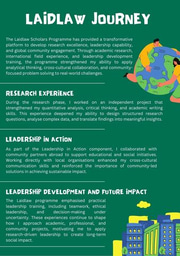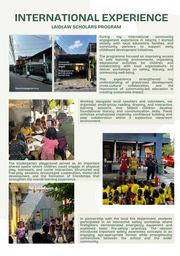Reflection for Health Promotion project with Think Pacific
“Life-changing” might be one of the most overused words to describe an experience that it has become a cliché. Admittedly, I have thrown the word around when I talk about other experiences due to a lack of better vocabulary, but six weeks in Fiji with other Laidlaw scholars has taught me what “life-changing” really means. When given the list of central Laidlaw summer projects to choose from last year, this health promotion project in a local Fijian village stood out to me because I watch too much Grey’s Anatomy, a TV show about doctors, and somehow think that I want to contribute to public health despite studying a remotely related subject, English literature. My decision has been met with some resistance – my parents expressing that they would rather have me stay comfortably under air-conditioning in London, and my friends doubting if I can really go without running water. I was hesitant too, but I thought it is a now-or-never opportunity, after all will I go to a Fijian village after graduation whilst trying to make ends meet? I am glad I was determined enough because this trip has shown me a different perspective on life and allowed me to learn new things about myself.
The project comprised of two parts, the physical health workshops which focus on diabetes and mental health workshops which introduce the idea of emotional well-being to the youths of the village of Jubairata. We stayed in local homes, had a mum (“lewa”) and a dad (“toe”); cooked and ate Fijian food, used bucket showers, attended their church services etc, living the authentic Fijian life. The workshops were impactful, but personally I’ve made more impact through my personal relationships with the villagers. My housemate and I encouraged our family to put less sugar into the tea and incorporate more vegetables into our diet. We also pushed our lewa to get her feet checked as we noticed an infection, and had we not done so, an amputation might have to be performed. Through talking openly with our family, we have also shown them the importance of expressing feelings with honesty, something that is not common in an emotionally repressed and conservative culture.
The physical environment was challenging to say the least, rats were frequent visitors of the house, our beds were infested with bed bugs and food that was always prepared in unhygienic conditions caused a lot of us to have stomach issues. In an environment like this, the hand foot mouth disease won the battle against my immune system, leading to a few days of suffering from fever, hands lesion and pain in the feet. I hit a low point – counting down to days when I can take a comfortable shower, sleep on clean bed sheets and not have to worry about being sick half the world away from home. It was the warmth and love from my lewa that kept me going through the hardship. What a wise and caring woman she is, I will always remember the mornings when she calls out “children, breakfast is ready!”, or when she held my hands to pray or the way she ran towards the truck that was driving us away from the village at the end of the project. This beautiful relationship we have built with our host families made the challenges worth it. Maybe without the lows we can never truly appreciate the good parts.
Six weeks was enough for me to feel like part of the village, and a part of me will always be Samanunu (the Fijian variant of my name Samantha). I will always remember singing the hymns in the community hall on the day of our farewell celebration, being woken up by chickens at 5am and admiring the views of the river that looks like a Windows wallpaper. I am forever grateful to be welcomed into Jubairata like one of their own, to be made to feel at home so far away from home. I will carry this experience forward with me in life, being more resilient to obstacles and thankful for what I have. Thank you, Jubairata.


Please sign in
If you are a registered user on Laidlaw Scholars Network, please sign in